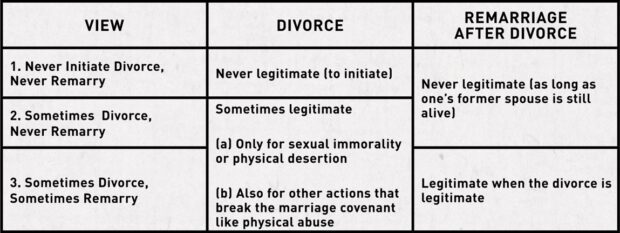What Jesus says in Matthew 5:31–32 is a key passage on divorce and remarriage. Here is a phrase diagram of Jesus’ words, made using the Logos Canvas Tool:

Evangelicals hold three main views on divorce and remarriage:

I believe that what constitutes grounds for a legitimate divorce is not limited to only sexual immorality or physical desertion but also includes other actions that break the marriage covenant such as physical abuse.
Jesus’s “exception clause” in Matthew 5:32 is the phrase “except on the ground of sexual immorality.” I believe that phrase states an exception to the rule. At least three arguments support that Jesus is saying that sexual immorality (Greek porneia) is a ground for divorce and that remarriage is legitimate when the divorce is legitimate.
The use of porneia
The Greek word Jesus uses here for immorality, porneia, commonly referred to sexual immorality in general—that is, any kind of immoral sex. It does not refer exclusively to premarital sex in betrothal.
The extent of the exception
The exception clause qualifies both “everyone who divorces his wife” and “whoever marries a divorced woman” (Matt 5:32). That is, “whoever marries a divorced woman commits adultery”—except if that woman divorced legitimately.
The argument in Jesus’ day
In Jesus’ historical-cultural context, everyone—both Jews and gentiles—assumed that sexual immorality was a ground for divorce and that remarriage was legitimate when the divorce was legitimate. Jesus does not abolish this view.
Granted, Jesus is stricter than the Jews at the time. He was addressing what was a contemporary controversy—namely, how Jewish teachers at the time understood the phrase “some indecency” in Deuteronomy 24:1. The issue regarded no-fault divorce: “Is it lawful to divorce one’s wife for any cause?” (Matt 19:3).
At that time the Jews debated among themselves which of two rabbis to follow on divorce: (1) Shammai’s view was that if a wife commits porneia, then the husband must divorce his wife and may remarry. (2) Hillel’s view added to Shammai’s view that a husband may divorce for “any cause” and may remarry.
Both views required divorce for immorality and permitted remarriage; Jesus only permits it. Thus, when a spouse has a ground for divorce, that does not mean that he or she must divorce. To the contrary, since marriage is a sacred union, a married couple should do everything they can to avoid dividing that union.
***
This article condenses Andrew David Naselli, “What the New Testament Teaches about Divorce and Remarriage.” Detroit Baptist Seminary Journal 24 (2019): 3–44 and was originally published in the September/October 2022 issue of Bible Study Magazine. Slight adjustments, such as title and subheadings, may be the addition of an editor.
Related articles
- Interview with Jonathan T. Pennington: The Sermon on the Mount and Human Flourishing
- Why Obedience to Jesus Trumps All: Thoughts on the Sermon on the Mount
- The Twist in the Sermon on the Mount That You Probably Missed
Related resources
No Quick Fix: Where Higher Life Theology Came From, What It Is, and Why It’s Harmful
Regular price: $13.99






